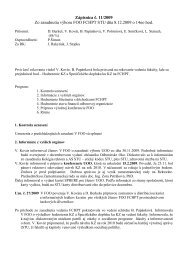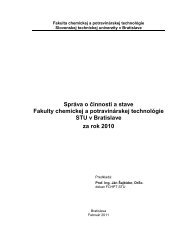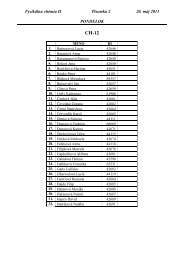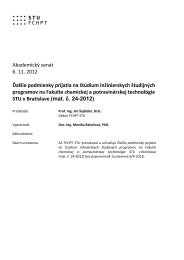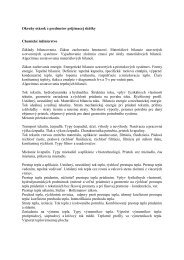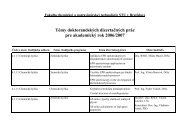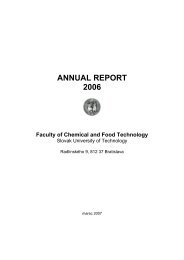rok 2007 - Fakulta chemickej a potravinárskej technológie
rok 2007 - Fakulta chemickej a potravinárskej technológie
rok 2007 - Fakulta chemickej a potravinárskej technológie
You also want an ePaper? Increase the reach of your titles
YUMPU automatically turns print PDFs into web optimized ePapers that Google loves.
IV. CURRENT RESEARCH PROJECTS<br />
A. VEGA Project No. 1/2390/05 Evaluation of agroindustrial materials using biotechnological<br />
means by application of microorganisms producing metabolites for food, agriculture,<br />
pharmacy and veterinary uses (Milan Čertík)<br />
The project is based on physiological regulation of microbial production of essentials polyunsaturated and<br />
conjugated fatty acids, squalene and sterol derivatives, organic acids (lactic acid), polyols (erythritol), ethanol,<br />
pigments (carotenoids, azaphilonic metabolites, mitorubrinic acid), polyketide metabolites and pharmaceutical<br />
using agroindustrial sources. Observations gained from parameter studies and optimisation of fermentation<br />
process provide useful information about aimed regulation of biochemical processes in fermentation technologies<br />
a thus they will create basis for link between basic and applied research that will have uses in both domestic and<br />
international research in this field. The project will result in proposals of equipments for experimental transfer from<br />
laboratory scale to semi-industrial scale. Fermentation preparation of these metabolites will contribute to<br />
expanding of their application in food, medical, pharmaceutical and veterinary practices.<br />
Project duration: from 01.01.2005 to 31.12.<strong>2007</strong><br />
B. VEGA project No.1/2391/05 Fermentation processes, bio-ethanol production,<br />
microorganisms, immobilisation systems, wine, beer (Daniela Šmogrovičová)<br />
The aim of this project is to develop areas of biotechnology using fermentation processes with free and<br />
immobilized cells of microorganisms, for purpose of ethanol fermentation improvement in fermented beverages<br />
and bio-ethanol production. The focus will be on production of classical beverages fermentation productivity –<br />
traditionally fermented and special beer, different categories of wine and of fermented beverages with lowered<br />
content of alcohol and bio-ethanol production from renewable starch resources. Within the project possibility of<br />
“very high gravity“ technologies – uses concentrated substrates – will be verified. An increase in gravity results in<br />
higher metabolic activity and increased ethanol production, but an effect of osmotic pressure and toxicity of<br />
produced ethanol affected cell viability. Since immobilised cells show various modifications in physiology and<br />
metabolic activity, biochemical composition and morphology, as well, an application of immobilised yeast can<br />
improve their ability to ferment concentrated substrates in dependence on carrier and technique used for<br />
immobilisation and protect the yeast cells against osmotic and ethanolic stress. Immobilisation also influence<br />
yeast by metabolites co-production and consequently flavour and character of fermented beverage. Systematical<br />
introduction of immobilization principle with continualisation of the processes should be driven to their practical<br />
application. Integration of up-to-date knowledge about yeast and bacteria metabolism should result into<br />
improvement of fermentation and production of alternative beverages, as well as bio-ethanol.<br />
Project duration: from 01.01.2005 to 31.12.<strong>2007</strong><br />
C. VEGA Project No 1/4357/07 Bioremediation of soil contaminated by degradation products<br />
of the pesticides of the chlorophenols series: potential use of organomineral complex (OMC),<br />
humic acids, and zeolite (Katarína Dercová)<br />
The project has an ambition to bring new knowledge regarding the binding of organic contaminants of the<br />
chlorophenol series (predominantly pentachlorophenol - PCP) onto inorganic and organic parts of the tested<br />
sorbent – organomineral complex (OMC, produced by binding humic acids onto zeolite) and to study sorption<br />
abilities of humic acids isolated from different sources (e.g. lignite and oxyhumolite) for detoxification purposes in<br />
contaminated soil. The potential effect of humic acids on improvement of biodegradation will be studied as well.<br />
Immobilization processes observed in natural soil are of a great environmental importance as they may lead to a<br />
considerable reduction in the bioavailability and, as a result, of a toxicity of xenobiotics, e.g. pesticides or their<br />
degradation products. This may then lead to facilitation of biodegradation after a subsequent release of the bound<br />
chlorophenols due to the activity of microorganisms and decrease of pH (acid rains). Investigation of the effect of<br />
chlorophenols on microbial cells of the indigenous bacterial consortium or bioaugmented bacteria and ecotoxicity<br />
of soil will be also included in the project because presence of these compounds markedly influences<br />
biodegradation ability, survival, and colonization of microorganisms at their application in bioremediation<br />
technologies during decontamination.<br />
Project duration: from 01.01.<strong>2007</strong> to 31.12.2009<br />
75





